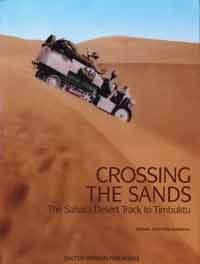Crossing the Sands
By Ariane Audouin-Debreuil
Translated by Ingrid MacGill
The Sahara Desert Track to Timbuktu by
Citroën Half Track
|
 |
|
ISBN-13 : 978-1-85443-222-3
Publication Date : January 2007
Page Size : 33Omm x 250mm 194 pages, case bound
with dust jacket
Illustrations : 200 black and white period
photographs, 20 colour images, 12 maps
Published by : Dalton
Watson Fine Books
Price : USD65/GBP35
|
|
On
December 17, 1922, André Citroën sent an
expedition of Citroën
halftracks or autochenilles to follow the camel
tracks across the
Sahara desert from Algeria to Timbuktu on the
banks of the River Niger.
This was the first motorized crossing of the
Sahara and took twenty one
days. It permitted the establishment of a land
connection between North
Africa and the Sudan, at that time extremely
isolated, and opened the
way for the exploration of the heart of Africa.
As well as the desire
to write, Ariane Audouin Dubreuil also inherited
her father's passion
for travel. Her father was one of the pioneers
of the exploration of
the Sahara during those years. For the last
fifteen years, she has
given lectures on the three Citroën expeditions
of her father, and has
written two other books: La Croisière jaune,
about the expedition to
Asia, which received the 2003 Grand Prix Jules
Veme, and La Croisière
noire, on the expedition to Africa and
Madagascar. She is also a
psychologist and the Assistant Mayor of
Boulogne-Billancourt in Paris.
|
An
odd book, this. Fully a third of it is devoted to
the air
exploration of the Sahara and has nothing to do with
Citroëns.
The rest of it is about the first crossing of the desert
by Citroën
Kegresse halftracks and is effectively a series of
excerpts from
diaries kept by the author’s father, Louis
Audouin-Dubreuil.
However, I find myself wishing it were laid out like the
diaries from
which it is derived - it seems to me that it comprises a
whole series
of non sequiturs.
I find the translation 'odd' - it attempts to
capture the early twentieth century whimsical and florid
style of the
author and ends up being almost a parody (I wish I could
compare it
with the original French) and I am annoyed by the
over-liberal use of
untranslated Berber and Tuareg words (albeit that there is
a glossary
at the back).
It also makes the assumption that the reader will be
familiar with France's North African colonial history.
The book is absolutely gorgeous even if some of the period
photos don't really warrant being enlarged.
This is the first of a series of three books covering the
pioneering
journeys undertaken by her father in the Citroën Kegresse
“Autochenilles”.
|


